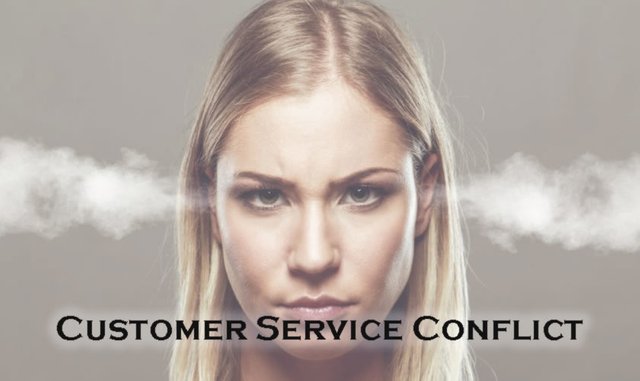Customer Service Confrontation and Conflict

A business has to know how to handle complaints well if it's to retain customers and ensure their satisfaction. In this course, you'll learn how to avoid common mistakes and how to master an effective complaint-handling process. You'll also be given the opportunity to practice the skills you learn.
CUSTOMER SERVICE CONFRONTATION AND CONFLICT

ay you get home with a new DVD player you've just purchased, only to discover that it's not working. Nothing even lights up when it's plugged in. When you phone the store to complain, the person who responds sounds bored and is completely unhelpful. He says you better read the manual. The disappointment and frustration you felt before the call turns into plain fury.
REFLECT
When things go wrong with the products or services you offer, customers naturally get upset, and both they and your company suffer negative consequences.
NEGATIVE CONSEQUENCES
Customers may lose money and time, and experience a range of other negative consequences, depending on what the problem is with a product or service. They may also lose trust in your company.
Negative consequences for the company include loss of customers' business and a damaged reputation. In some cases, customers may sue companies as a result of bad service.
If you're someone who deals with customers, you can't necessarily prevent problems from occurring – but you can respond to customers' complaints in a way that ultimately leaves them satisfied.
But if you don't handle complaints effectively, then – like the call center operator who took the complaint about the malfunctioning DVD player – you can exacerbate situations and leave customers frustrated and angry.
Research shows staff indifference is one of the most frequent causes of companies losing customers. If employees come across as unhelpful or uncaring, customers may decide to take their business elsewhere.
So it's vital, when customers have complaints, you make them feel like you listen to them, try to understand what they're saying, and take them seriously.
A business has to know how to handle complaints well if it's to retain customers and ensure their satisfaction. In this course, you'll learn how to avoid common mistakes and how to master an effective complaint-handling process. You'll also be given the opportunity to practice the skills you learn.
AVOID COMMON MISTAKES
If you aren't properly trained in handling complaints, you risk worsening a situation when you face angry or frustrated customers.
For example, you could antagonize your customers by not taking responsibility for a problem, overstepping your professional boundaries, or being rude – even unintentionally. When this happens, it's likely to exacerbate the customer's frustration, and you're unlikely to succeed in resolving the customer's problem adequately.
MASTER THE COMPLAINT-HANDLING PROCESS
An effective complaint-handling process consists of a series of steps, each of which requires you to have particular skills.
For example, you need to deal with your customers' feelings before investigating problems. You then need to come up with appropriate solutions, and follow up with customers to ensure their satisfaction.
I have been teaching and training agents, team leaders, supervisors, managers and admins of call centers and other businesses in BPO related fields. This series, comes as a result of that experience. I have more than 4,000 modules that I plan on sharing here. This is # 002-01
I was a former csr/tsr it was very hard to handle customer concerns especially at the beggining if the call if the cx was very irate! Waaaah... hehehe! This is very nice thank u @cebunick another informative blog!
Thank you @prettydead24 stay tuned for the next exciting post ;)
You got a 2.17% upvote from @brupvoter courtesy of @cebunick!